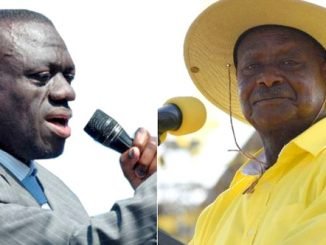
Kampala, Uganda | URN| Hundreds of Ugandans last week took to social media to express their views on the arrest of presidential candidate Robert Kyagulanyi alias Bobi Wine and also calling for an end to brutality against civilians.
Bobi Wine was arrested on Wednesday 18th, November 2020 for breaking the COVID-19 guidelines. His arrest sparked off unrest in different parts of the country as security officers battled rioters. In ensuing battles, 49 people are reported to have since lost lives and hundreds still nursing wounds.
Our reporters have been monitoring the trends on social media including Facebook and Twitter where tens of hundreds of posts and comments are being shared.
For instance, analysis shows that at least 100,000 tweets were posted between Wednesday 18th afternoon and Thursday 19th morning running under hashtags #FreeBobiWine and #EndPolicebBrutality.
From written posts to photos and videos of brutalized civilians, with some activists being involved in over 300 tweets and Facebook posts within the two days, one wonders if social media activism achieve anything.
Recent reports indicate that social media is becoming a big tool used for activism, citing the viral hashtag #MeToo that sparked an international movement against sexual harassment, the widely spread #FeesMustFall campaign used by several university students and the most recently #SaveBugoma.
Allan Mutagubya is one of the youths who have been using hashtags to send out messages to the public and also expressing his feelings on the developments.
Mr Mutagubya says that while some people see social media as trivial and useless, he states that when a conversation starts from somewhere and one presents it to the platforms, its better than nothing.
To him, social media has the power to quickly and widely spread awareness and information about causes to huge numbers of people and also provides a platform for underrepresented minority groups to speak out.
“See right now, the action in Uganda is already known to the world and the pressure must be mounted on the government. Remember the event in Arua? youths used social media to express themselves and everyone knows the results. That is the power of this platform,” says Mutagubya.
But Ugandan Human rights lawyer Nicolas Opio says that in terms of influencing the response of those in government, more so in Uganda, it appears that social media is insufficient. He however adds that in terms of mobilizing the public, it is a useful platform especially in a country where protests and demonstrations are being criminalized.
Opio also feels that social media bridges the communication gap in the country where the mainstream media is intimidated and afraid of telling the truth. To him, social media is now the only space where people can have a 360-degree view of events and also informing the outside world of what is happening in the country.
In their publication; Genuine Social Media Activism: A Guide for Going Beyond the Hashtag, writers Ashley Reid and Katie Sehl noted that “social media and activism have been inseparable since the 2010 Arab Spring demonstrations and 2013 when the #BlackLivesMatter hashtag was used for the first time.”
According to their analysis, in both events, social media and hashtags played an instrumental role in mobilizing the human rights movements offline, and also went on to inspire the rise of social activism including everything from #LoveWins to #TimesUp to #FridaysForFuture.
The Security Minister Gen. Elly Tumwine notes that many of ‘the called social media activists’ are using the platform to spread false news and also inciting violence to disrupt Uganda’s ‘hard-won peace’, but the government will not tolerate them at any point.
Read Also: President Museveni warns protestors over attacking NRM supporters
Police spokesperson Fred Enanga says that social media has been awash with videos and photos from foreign countries being circulated to paint a picture that they are happening in Uganda. He says that one of the disinformation that incited many youths claimed that Bobi Wine had been killed.
However, Opio worries that authorities might block the social media platforms as the case was in the recently concluded election in neighbouring Tanzania.
During the presidential elections in 2016, the Uganda Communications Communication [UCC] directed telecommunications providers to shut down social media platforms.



